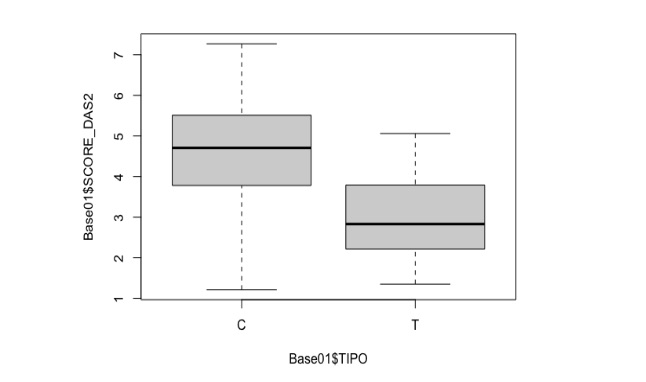Session Information
Date: Monday, November 8, 2021
Title: RA – Treatments Poster II: PROs, Biomarkers, & Systemic Inflammation (1223–1256)
Session Type: Poster Session C
Session Time: 8:30AM-10:30AM
Background/Purpose: High activity rates of Rheumatoid Arthritis (RA) lead to an increased risk of mortality. RA patients have a high incidence of comorbidities, associated with the chronic inflammatory process, with joint inflammation and deformity, loss of functional capacity and quality of life. Although over time it is difficult to sustain low disease activity / remission rates, associated with a decrease in functional disability and therefore a better quality of life, reaching these goals in a timely manner leads to better functional and quality of life outcomes for patients (1). The objective of the study was to investigate the effect of acupuncture, combined with the pharmacological treatment instituted, on RA activity, through DAS28-CRP.
1 Scott IC, Ibrahim F, Panayi G, Cope AP, Garrood T, Vincent A, et al. The frequency of remission and low disease activity in patients with rheumatoid arthritis, and their ability to identify people with low disability and normal quality of life. Seminars in Arthritis and Rheumatism 49 (2019) 20-26
Methods: Randomized, prospective and controlled experimental study. Patients were submitted one acupuncture session per week for 8 consecutive weeks, with DAS28-CRP evaluation immediately before the 1st acupuncture session and another evaluation one week after the last acupuncture session. The 101 patients were randomly assigned to an Experimental Group (EG), submitted to acupuncture (n=50) and Control Group (CG), not submitted to acupuncture (n=51). All maintained pharmacological treatment in progress, not initiating any another pharmacological and / or non-pharmacological treatment during the present study.
Results: The results obtained in the first evaluation were similar between the study groups, with no significant differences that allow them to be distinguished from each other, mean (4,129 versus 4,245) and median (4,220 versus 4,200), classifying them as EG and CG, respectively, with moderate activity, defined by DAS28-CRP. In the evaluation carried out after treatment with acupuncture for EG patients, it was obtained through the DAS28-CRP score, mean (2,993) and median (4,541). CG patients, in the last evaluation, presented different and very significant results, namely the mean (4,541) and median (4,705). According to the definition by DAS28-CRP, after treatment with acupuncture, the EG decreased the disease activity index, defining itself with low activity, in contrast to the CG that maintained values very close to those of the first evaluation, with a moderate disease activity index. This statistical evidence is graphically explained in Graph 1 and Graph 2.
Conclusion: The effect of acupuncture was evident in patients whose treatment was combined with the pharmacological treatment already in place. The decrease in the DAS28-CRP score was clearly visible, and it’s possible to inform that acupuncture, when combined with treatment already underway, allows to decrease RA activity. Thus, acupuncture may be a non-pharmacological intervention to start early, when diagnosing RA, as a way of managing and treating the disease, based on the individual needs of each patient.
 Graph 1 – Boxplot DAS28-CRP scores: 1st Review Experimental Group and Control Group
Graph 1 – Boxplot DAS28-CRP scores: 1st Review Experimental Group and Control Group
 Graph 2 – Boxplot DAS28-CRP scores: 2nd Review Experimental Group and Control Group
Graph 2 – Boxplot DAS28-CRP scores: 2nd Review Experimental Group and Control Group
To cite this abstract in AMA style:
Seixas D, Farinha F, Pacheco da Fonte M, Laranjeira M, Rua M. Acupuncture in Rheumatoid Arthritis Activity [abstract]. Arthritis Rheumatol. 2021; 73 (suppl 9). https://acrabstracts.org/abstract/acupuncture-in-rheumatoid-arthritis-activity/. Accessed .« Back to ACR Convergence 2021
ACR Meeting Abstracts - https://acrabstracts.org/abstract/acupuncture-in-rheumatoid-arthritis-activity/
